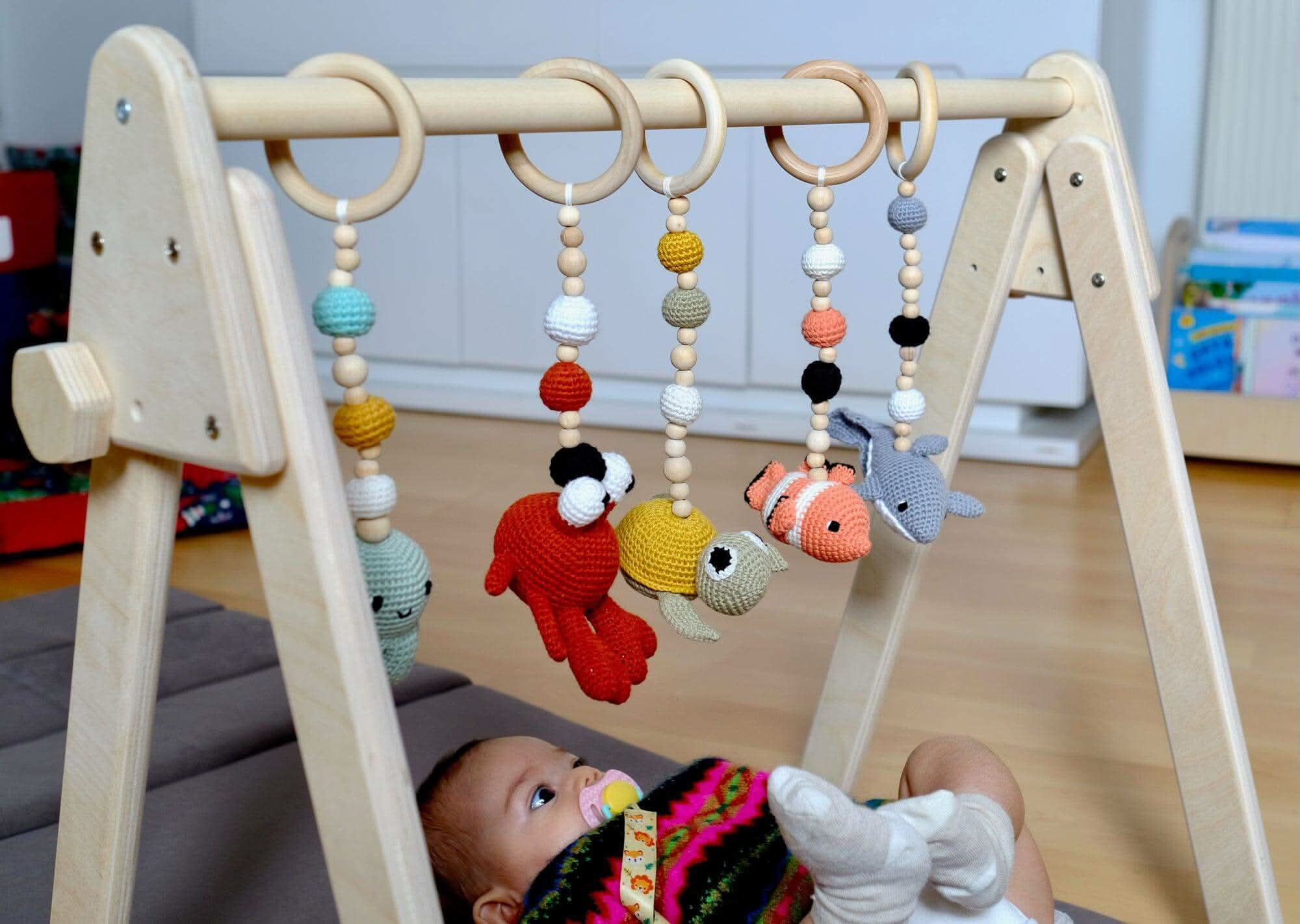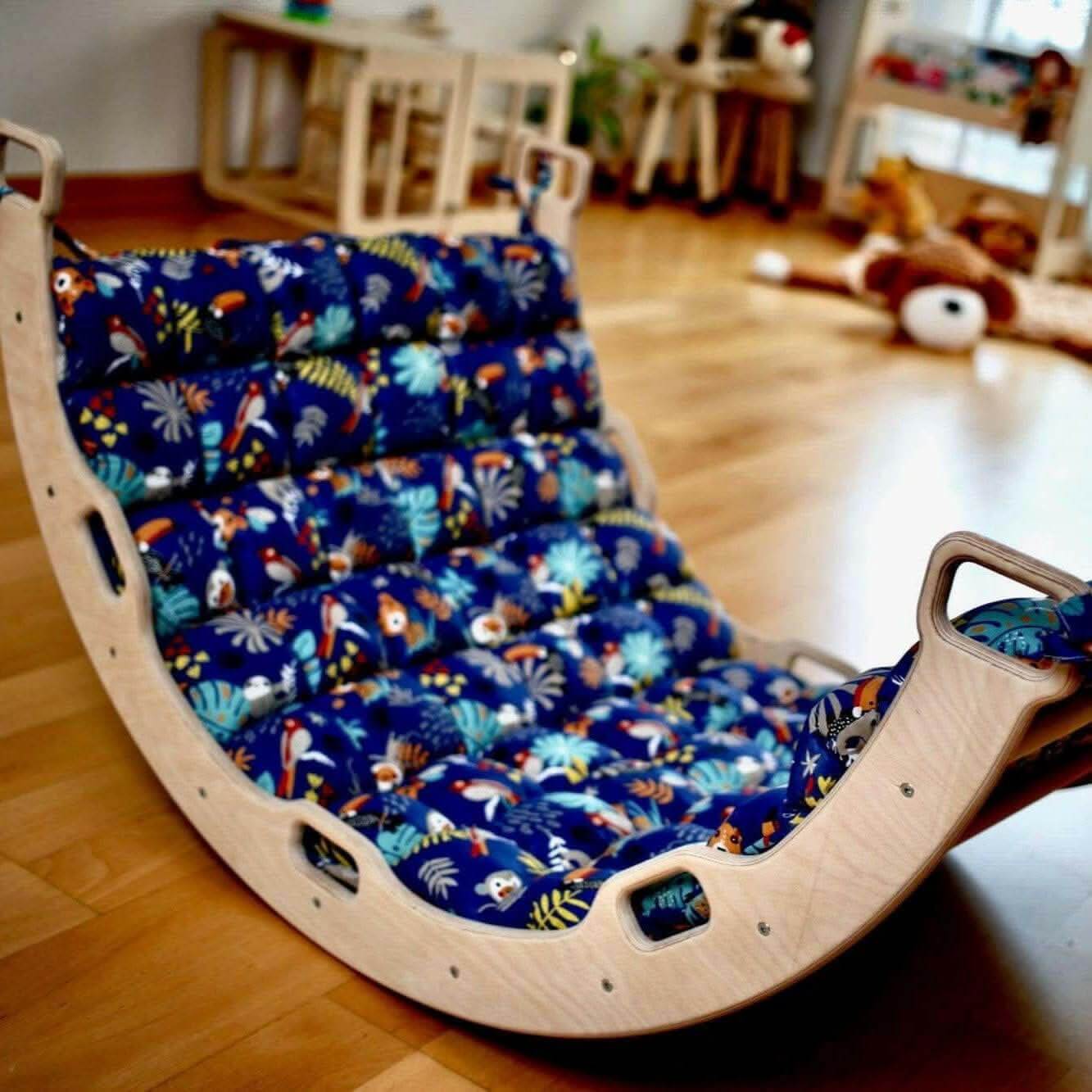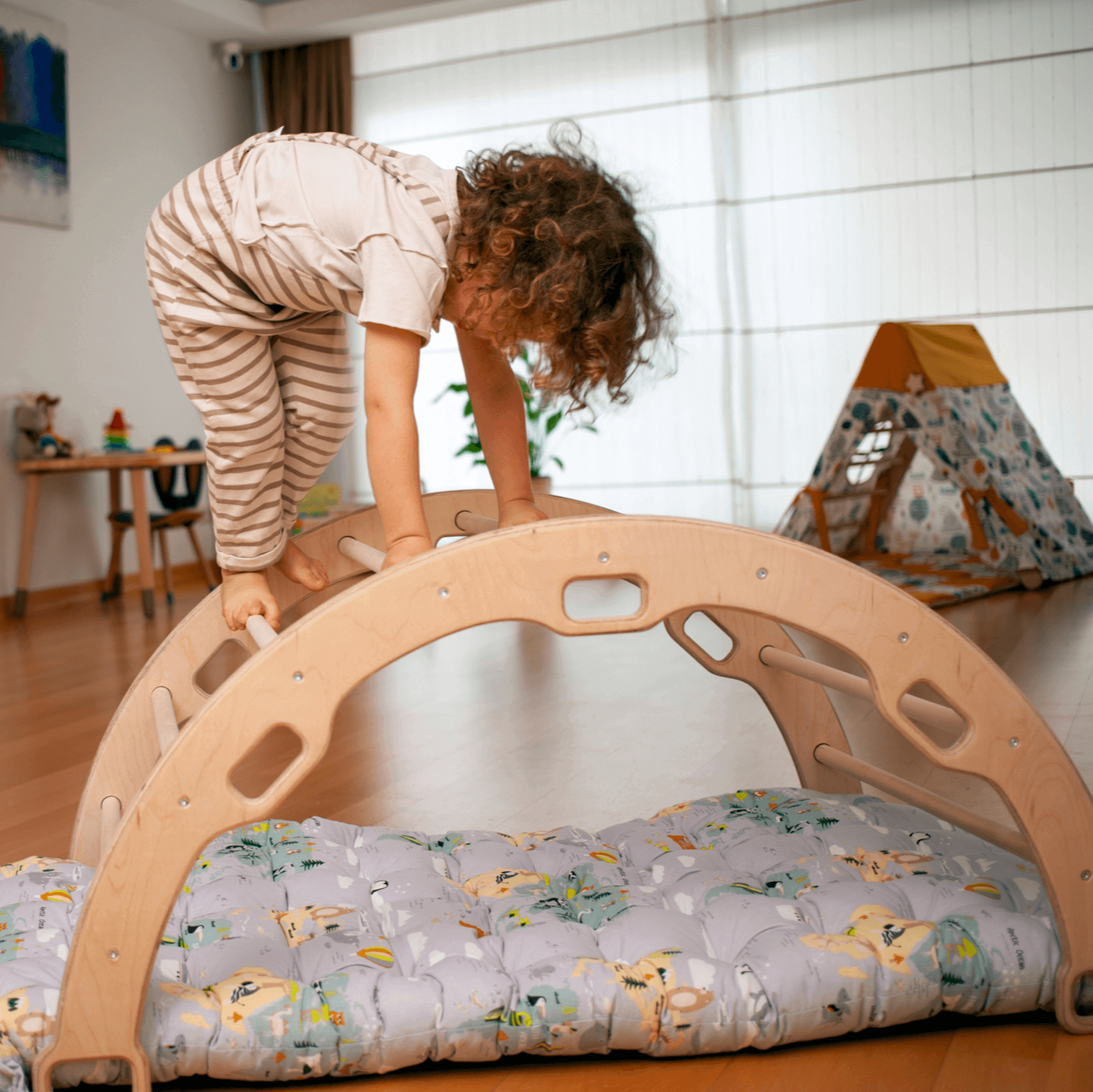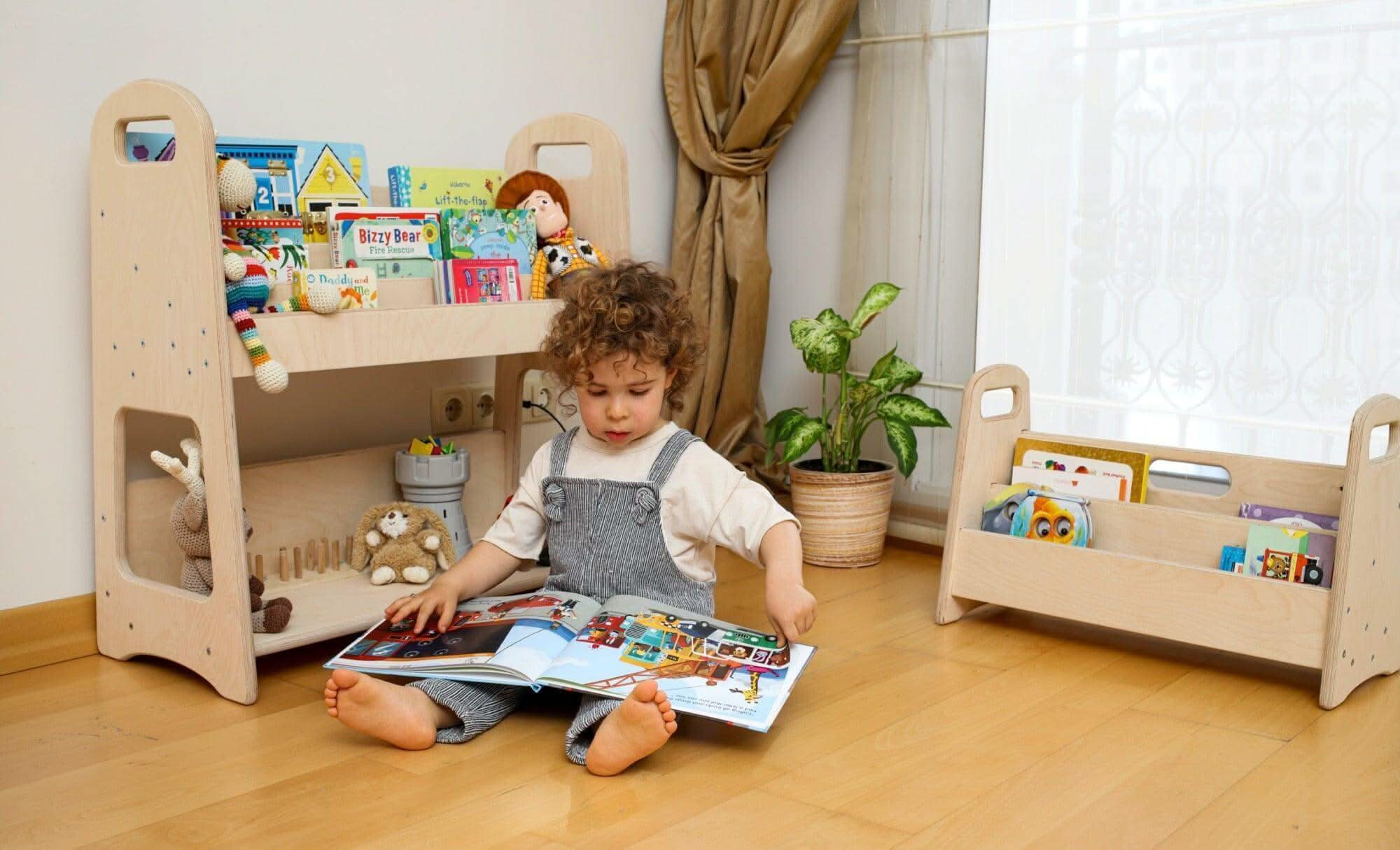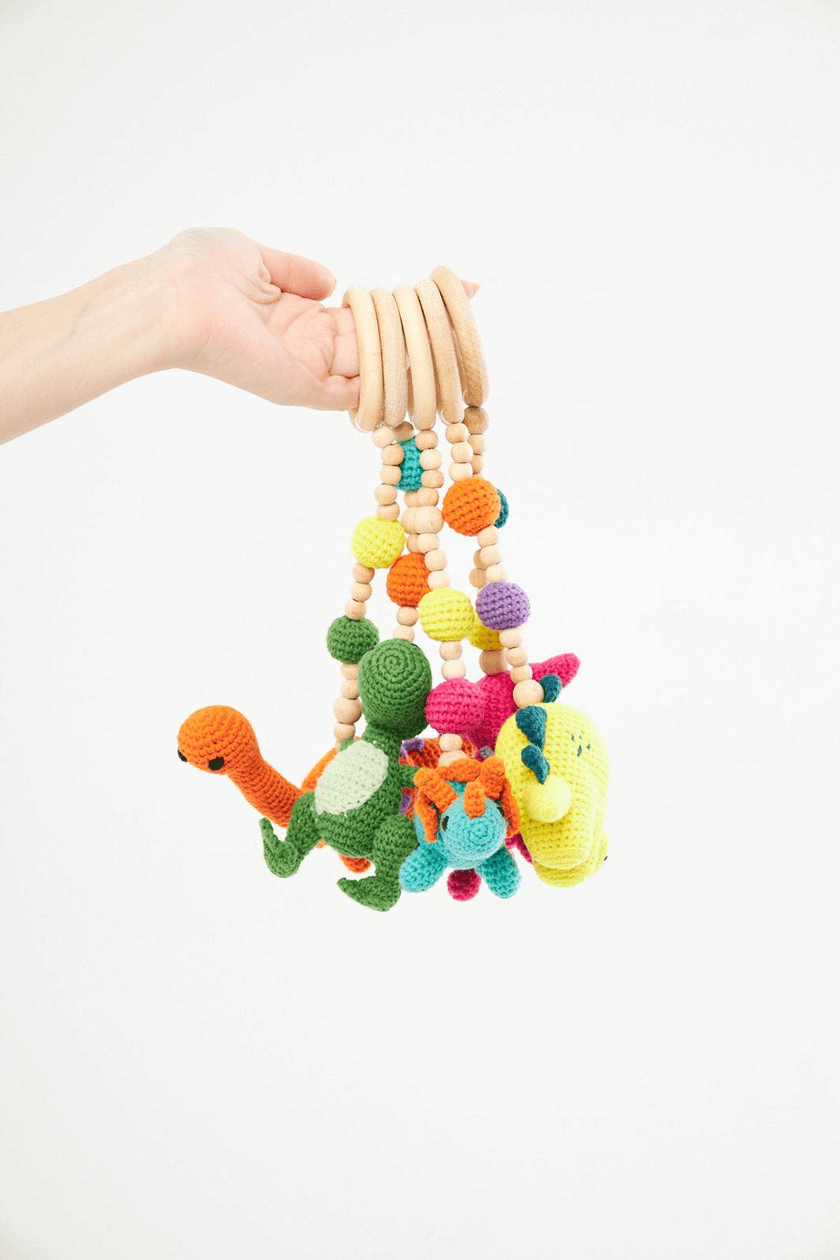

· By halit burak capraz
Montessori Infant Mobiles vs. Traditional Baby Mobiles: Which is Better for Your Child?
Montessori Infant Mobiles vs. Traditional Baby Mobiles: Which is Better for Your Child?
When it comes to creating an engaging and nurturing environment for your little one, choosing the right mobile can make all the difference. Montessori infant mobiles have emerged as a favorite among parents looking for more than just decoration; they serve a purpose that extends beyond aesthetics. Designed to stimulate visual tracking and cognitive development, these unique Montessori baby mobiles offer a stark contrast to traditional baby mobiles. But what exactly sets them apart? Let's dive into the world of Montessori crib mobiles and explore their benefits, which include:
- Visual Stimulation: Infants are instinctively drawn to objects that move and change. Montessori mobiles are thoughtfully designed with varying shapes, colors, and patterns that actively engage a baby's attention, promoting visual exploration.
- Motor Skill Development: Regular exposure to these educational baby mobiles enhances hand-eye coordination and tracking skills as babies learn to follow the movement of the objects hanging above them.
- Calm Environment: Unlike their traditional counterparts which often rely on bright colors and loud noises, Montessori-inspired infant toys focus on minimalism, providing a serene space conducive to peaceful sleep.
“Montessori infant mobiles are not just pretty decorations; they are vital tools for your child's development.”
The thoughtfulness behind each design means that these wooden Montessori mobiles are not merely hanging toys—they're tools that foster learning through sensory experiences. With options ranging from black and white Montessori mobiles to colorful handcrafted designs, there’s something for every minimalist nursery decor style. And let’s be honest—who doesn’t love a bit of aesthetic charm in their baby’s room?
In addition to their educational benefits, many Montessori nursery mobiles are created from eco-friendly materials, ensuring safety for your child while also being kind to the planet. It’s a win-win! Not only do you promote visual stimulation with these unique designs, but you also contribute positively towards environmental sustainability.
So which mobile is better for your child? While traditional baby mobiles can be delightful eye-catchers with lights and music, they may lack the crucial developmental focus offered by Montessori options. As you venture into this exciting phase of parenthood, consider investing in a developmental baby mobile that aligns with your values of education and creativity.
The choice is clear: opt for an interactive experience with the best-selling Montessori infant products that not only engage but also educate your little one.
Understanding Montessori Infant Mobiles
Understanding Montessori infant mobiles is essential for any parent seeking to enrich their child's early developmental years. Unlike traditional baby mobiles that often entertain with flashy lights and loud music, Montessori infant mobiles provide a thoughtful approach to visual and sensory stimulation that nurtures growth and learning. These handcrafted infant mobiles are designed to captivate an infant's attention through gentle movement and high-contrast patterns—elements known to spark curiosity in young minds.
Here are some key features that distinguish Montessori baby mobiles from their traditional counterparts:
- Simplicity in Design: Montessori nursery mobiles are characterized by their minimalistic aesthetic. This approach reduces overwhelming stimuli, creating a calming environment conducive to both play and sleep.
- Focus on Visual Development: Many infants gravitate toward simple shapes and high-contrast colors, making black and white Montessori mobiles particularly effective. Infants can easily see these designs from their cribs, enhancing their ability to track movement and develop skills.
- Promoting Motor Skills: The regular use of Montessori hanging toys encourages infants to reach out, grasp, and interact with their surroundings. This playful engagement aids in developing essential motor skills like hand-eye coordination.
“Montessori infant mobiles serve as more than decorative pieces; they are interactive tools for your baby's growth.”
The potential benefits don’t stop there! Studies indicate that sensory baby mobiles can significantly enhance cognitive development during the first months of life when brain plasticity is at its peak. By incorporating elements of visual stimulation, auditory experiences (think gentle chimes), and tactile interactions, these educational baby mobiles create a rich tapestry of learning opportunities.
This focus on developmental milestones makes them ideal choices for parents committed to fostering creativity and learning from the very start. For example, when you hang a wooden Montessori mobile above your baby's crib, you’re not just adding decorative flair—you’re providing an innovative infant learning tool tailored to stimulate curiosity and exploration.
Let’s also not forget about safety. Many modern Montessori products prioritize non-toxic materials, ensuring that your little one plays with safe items while exploring their world. Investing in eco-friendly baby mobiles means you’re not just nurturing your child; you're also supporting sustainable practices—because who doesn’t want a healthier planet for the next generation?
In conclusion, as you contemplate the best options for your child's room decor, remember the unique benefits that Montessori-style products bring. By integrating thoughtful design with educational value, Montessori infant mobiles make an excellent addition to any nursery focused on early learning experiences.
The Philosophy Behind Traditional Baby Mobiles
Traditional baby mobiles have long been a staple in nurseries worldwide, often seen as charming decorations that dangle above cribs. However, their design and purpose extend beyond simple aesthetics. Rooted in classic philosophies of child development, traditional mobiles aim to captivate infants with vibrant colors them entertained while encouraging moments of wonder and curiosity.
Here are some key aspects of the philosophy behind traditional baby mobiles:
- Visual Engagement: Traditional baby mobiles typically feature bright colors and whimsical shapes designed to grab an infant's attention. The idea is that these visuals stimulate the baby’s visual senses during critical developmental stages.
- Auditory Stimulation: Many traditional mobiles incorporate soothing sounds or gentle music, providing auditory stimulation that can calm babies and create a peaceful sleeping environment. Think of it as a lullaby on a string!
- Attracting Focus: With various items spinning above them, infants can practice focusing their eyes—an essential skill for developing their visual tracking abilities. As they gaze upwards, they learn to observe their surroundings more closely.
“A traditional mobile is like the opening act of a grand performance, setting the stage for the sensory experiences that will follow.”
However, it's worth noting that while these colorful creations can be delightful distractions for babies, they may not offer the same depth of developmental benefits found in Montessori infant mobiles. For instance:
- Noisy Distractions vs. Calmness: The auditory stimuli from many traditional mobiles may sometimes overwhelm rather than soothe infants, contrasting sharply with the serene environment fostered by minimalist Montessori designs.
- Lack of Educational Focus: Though visually appealing, many traditional designs don’t emphasize cognitive development or motor skills as effectively as Montessori options do.
The primary goal of traditional baby mobiles is to entertain—there's no denying that spinning cute animals or twinkling stars can bring joy to little ones! Yet parents should consider whether this entertainment aligns with their values for early childhood learning. Are you looking for just eye candy? Or do you seek tools that support holistic development?
This distinction becomes particularly significant when paired with your approach to nursery decor: Is your style more vintage-inspired with colorful motifs or modern and minimalistic? Either way, incorporating thoughtful design elements can transform a nursery into an engaging learning space while ensuring your baby's sensory experiences are enriching rather than overstimulating.
The choice ultimately rests with you as a parent! Whether you're drawn to classic charm or innovative learning tools like Montessori infant mobiles, what's most important is creating an environment that nurtures your child's growth at every turn.
Comparing Developmental Benefits
When comparing the developmental benefits of Montessori infant mobiles and traditional baby mobiles, it becomes clear that the former offers a unique approach to stimulating a child's early growth. Here are some of the pivotal ways in which Montessori infant mobiles shine in developmental aspects:
- Enhanced Visual Tracking: Montessori infant mobiles are designed with varying shapes and subtle movements, which encourage infants to follow them visually. This is crucial for developing visual tracking skills; studies show that regular exposure can significantly improve an infant's ability to track objects with their eyes, leading to better hand-eye coordination as they grow. Infants are naturally drawn to movement and patterns, making these mobiles an excellent educational tool.
- High-Contrast Designs: Many Montessori nursery mobiles feature high-contrast color schemes, particularly black and white options. Research indicates that infants can more easily perceive these colors, which captures their attention and ignites curiosity—an essential ingredient for cognitive development.
- Sensory Exploration: Montessori hanging toys often incorporate various textures and shapes, inviting infants to explore through touch as well as sight. This multi-sensory approach fosters sensory integration, helping babies make sense of their environment while engaging in quiet playtime activities.
“Montessori infant mobiles encourage active learning through sensory experiences—allowing babies to explore their world while they hang out in their cribs.”
Unlike traditional baby mobiles, which might bombard little ones with bright lights and loud music—often seen as overstimulating—Montessori designs focus on creating a serene atmosphere conducive to calmness and relaxation. This peaceful environment is not just about aesthetics; it promotes restful sleep, which is fundamental for an infant's overall development.
Additionally, many parents appreciate the eco-friendly aspect of Montessori products. Being handcrafted from natural materials ensures safety for your child while also being gentle on our planet. So, when you ponder over choosing a mobile for your little one, consider how Montessori products align with your values of education and sustainability.
The difference between the two options isn't merely superficial; it's foundational to how your child learns and interacts with the world around them. Opting for Montessori-inspired products means you're investing in tools that nurture curiosity and promote essential developmental milestones—providing your baby not just entertainment but a pathway toward growth.
In summary, while both types of mobiles serve their purposes within a nursery setting, Montessori infant mobiles offer a deeper connection to your child's developing mind. They engage infants in meaningful ways that promote exploration and skill-building—a choice every parent can feel good about!
Material Considerations: Safety and Sustainability
When considering the materials used in infant toys and decor, safety and sustainability are paramount. In the realm of Montessori infant mobiles, these factors play a crucial role as they prioritize your child's well-being while being environmentally. Traditional baby mobiles may be crafted from a variety of materials, but they often fall short of the eco-friendly standards that modern parents seek.
- Non-Toxic Materials: Many Montessori baby mobiles are made from natural, non-toxic materials such as wood and organic fabrics. This ensures that when your little one reaches out to explore, they are engaging with safe items. Traditional mobiles, on the other hand, may contain harmful chemicals or synthetic materials that could pose risks to infants.
- Handcrafted Quality: A significant number of Montessori crib mobiles are handcrafted with care and attention to detail. This artisanal approach not only supports small businesses and local artisans but also guarantees a level of quality often missing in mass-produced alternatives.
- Sustainable Practices: Eco-friendly baby mobiles embody sustainable practices by using responsibly sourced materials. For instance, companies often utilize renewable resources or recycled materials in their designs—giving parents peace of mind that they're making environmentally aware choices for their homes.
“Choosing eco-friendly materials for your child’s toys isn’t just about safety; it’s about creating a healthier planet for future generations.”
The focus on sustainability extends beyond initial choices; it reflects a growing awareness among parents regarding the impact of consumer habits on the environment. Research indicates that around 70% of consumers consider sustainability when making purchasing decisions (Source: McKinsey & Company). By opting for Montessori-inspired infant toys like visual stimulation mobiles that adhere to these principles, you align your values with those of an increasingly eco-conscious community.
Moreover, minimalistic designs commonly found in Montessori nursery mobiles contribute to reducing clutter—not just visually but also environmentally—by emphasizing quality over quantity. The deliberate choice to avoid excessive plastics or electronics fosters an atmosphere of calmness in your child’s space while still providing essential sensory engagement.
In conclusion, material considerations in selecting nursery decor cannot be overlooked. Montessori infant mobiles offer a unique blend of safety and sustainability without compromising on visual appeal or interactive benefits for your child. As you curate an enriching environment for your little one, let these eco-friendly options guide you toward making thoughtful choices that nurture both development and our planet.
Visual Appeal and Nursery Decor Themes
When it comes to choosing the perfect mobile for your baby's nursery, visual appeal matters just as much as developmental benefits. Montessori infant mobiles not only serve as captivating decor but also align with various nursery themes, transforming the space into a harmonious blend of learning and aesthetics. Unlike traditional baby mobiles, which often opt for flashy colors and distracting designs, Montessori-style options are characterized by their simplicity and elegance—a perfect match for minimalist nursery decor.
Consider the following aspects of how Montessori baby mobiles can enhance your nursery's visual theme:
- Aesthetic Harmony: Many Montessori crib mobiles embrace a muted color palette and natural materials, making them easy to integrate into any decor style—from modern to vintage. Their handcrafted designs often feature wood and organic fabrics, providing an artistic touch that enhances the overall look without overwhelming it.
- High-Contrast Designs: Black and white Montessori mobiles stand out for their ability to engage infants while being visually soothing. Research has shown that infants are particularly drawn to high-contrast visuals, making these designs not only educational but also strikingly stylish.
- Minimalist Approach: The essence of Montessori philosophy is rooted in minimalism. These educational baby mobiles avoid cluttered aesthetics, which helps create a serene space for both you and your child. This calm environment encourages restful sleep—an essential aspect of infant development.
“A well-designed baby mobile is not just decoration; it’s an invitation to engage with the world.”
Furthermore, incorporating these unique Montessori baby mobile ideas contributes to a child-safe environment free from toxic materials. Many are made from non-toxic substances, aligning with modern parents' concerns about safety in their child’s surroundings. Aesthetically pleasing yet practical choices can significantly elevate your nursery decor while ensuring safety—a win-win situation!
If you’re looking for innovative ways to create a visually appealing nursery while nurturing your child's development, consider integrating Montessori hanging toys that promote sensory exploration through gentle movement. The charm lies not only in their appearance but also in their ability to serve educational purposes without compromising on design.
As you curate your child's room, remember that the right mobile can seamlessly blend style with functionality—making those moments of quiet observation even more enriching for your little one. By choosing Montessori-focused designs over traditional ones, you’re not just decorating a space; you're creating an engaging learning environment filled with love and creativity.
Deciding What Works Best for Your Child
When it comes to your child's development, making informed choices can have lasting impacts. As you explore the differences between Montessori infant mobiles and traditional baby mobiles, consider what truly resonates with your child's needs and learning style. Here are some key points to help you decide what works best:
- Observe Your Child: Watch how your baby interacts with different types of mobiles. Do they seem more engaged with moving objects that have high-contrast designs? If so, a black and white Montessori mobile may be ideal for their visual development.
- Consider Your Values: Are you aiming for a serene environment that promotes calmness or one filled with colorful distractions? Montessori-style products often reflect minimalism in design, focusing on natural materials that ensure safety while promoting an educational experience.
- Seek Developmental Benefits: Think about the long-term developmental advantages. Montessori infant mobiles are designed not just to entertain but to stimulate cognitive growth and motor skills. Studies have shown that infants exposed to these educational baby mobiles can exhibit improved hand-eye coordination and tracking abilities.
- Safety First: Prioritize non-toxic materials for all nursery items. Many traditional baby mobiles may not adhere to eco-friendly standards, whereas a handcrafted wooden Montessori mobile often guarantees both quality and safety.
"Choosing a mobile is not just about decoration; it's an investment in your child's growth." - Parent's Guide to Early Learning
Ultimately, the choice comes down to what suits your family's philosophy on early learning. Incorporating Montessori principles into your child's environment doesn't mean sacrificing aesthetics—in fact, it enhances them! With options like Montessori nursery mobiles, parents can create beautiful spaces that nurture creativity while providing unique sensory experiences for their little ones.
The right mobile can serve as a gateway to exploration and imagination—so take the time to choose one that enriches both your nursery decor and your child's developmental journey.
```
